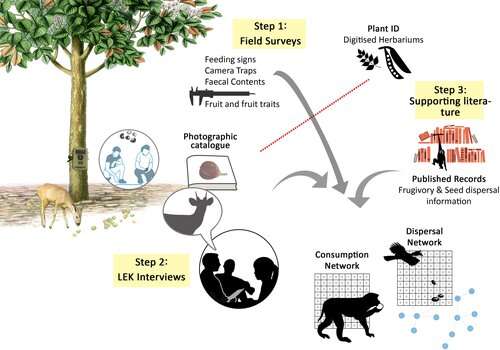Local ecological knowledge is useful for studying plant-animal interaction networks

Network studies focused on frugivory and seed dispersal commonly use frugivory censuses, camera trapping and fecal contents to build the interaction database. However, by using standard ecological methods, it's difficult to build quantitative interaction databases and networks in hyper-diverse and logistically challenging ecosystems.
In a study published in Methods in Ecology and Evolution, researchers from the Xishuangbanna Tropical Botanical Garden (XTBG) of the Chinese Academy of Sciences and their collaborators proposed a new approach applying local ecological knowledge (LEK) of indigenous communities to build an interaction database in ecosystems where the use of ecological methods alone is not feasible, or the cost or time required are prohibitive.
The researchers used a three-step approach to collect data on frugivory and seed dispersal interactions for canopy and sub-canopy plants in a hyper-diverse Sundaic forest in Peninsular Malaysia.
They conducted field surveys to catalog locally available fruit and record interactions with their consumers. Then they conducted a series of interviews with Orang Asli from different villages. Finally, they used published literature and other means to support and expand the interactions recorded in the interviews.
By using the novel approach, the researchers identified 2,063 unique interactions between fruit (164 plant species) and their animal consumers (34 taxa) within a 16-month field study.
Their results showed that local ecological knowledge is highly relevant for building detailed databases for ecological interactions in hyper-diverse and/or challenging ecosystems.
"This new approach has allowed us to produce the first comprehensive frugivory and seed dispersal networks in a hyper-diverse and megafauna-rich Sundaic forest and is replicable in other highly diverse and sensitive ecosystems," said Ahimsa Campos-Arceiz of XTBG.
More information: Lisa Ong et al, Building ecological networks with local ecological knowledge in hyper鈥恉iverse and logistically challenging ecosystems, Methods in Ecology and Evolution (2021).
Journal information: Methods in Ecology and Evolution
Provided by Chinese Academy of Sciences





















